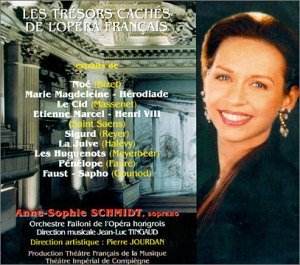The attraction here is the relatively unusual repertoire,
mainly from the nineteenth century from operas by Halévy (1835)
onwards and concluding with Fauré (1913), although to describe
Gounod’s Faust as a ‘hidden treasure’ (no, it’s not the Jewel
Song either) is somewhat disingenuous on the recording company’s
part. It all gets off to a shaky start with Saint-Saëns’ Henry
VIII, the opening of Act 4, leading into the pastiche 17th
century dance played by an offstage brass band (meant to be accompanying
a chorus … but not here) followed by Catherine of Aragon’s aria. The
problem is Anne-Sophie Schmidt’s soprano voice; she is no dramatic soprano
and frankly this is sub-standard singing. She fares better in later,
more lyrical, arias requiring less weight to the voice, such as Salomé’s
aria from Massenet’s Hérodiade. This is a ‘milk and water’
figure compared to Richard Strauss’s characterisation in his opera of
the same name, or Gounod’s Sapho (though the occasional approach
to high notes is irritatingly flat even here). It is interesting to
hear arias from unstaged works by Gounod, Bizet (Saraï’s aria could
have been for Michaela in Carmen), Massenet, as well as Fauré
and the Wagnerian Reyer, but the word ‘treasure’ is over the top, for
this has been very much the repertoire in the British Isles of such
enterprising groups such as the Wexford Festival, University College
London Opera, the Royal Academy of Music, or Chelsea Opera Group over
the years. It would be interesting to know if they are staged in France,
probably not would be my guess.
The acoustics of the Théâtre Impérial
de Compiègne are very dead, exposing the weaknesses of the Orchestre
Failoni de l’Opéra hongrois (why on earth a Hungarian band -
did they come cheap perhaps?) rather than its strengths, though from
time to time there is some accomplished solo work (for example from
the principal clarinet and the harpist). The result is a strangely old-fashioned
bloomless sound as if from the 1930s. By the end Mlle Schmidt’s vocal
inadequacies begin to irritate. Approach this treasure trove with caution.
Christopher Fifield


